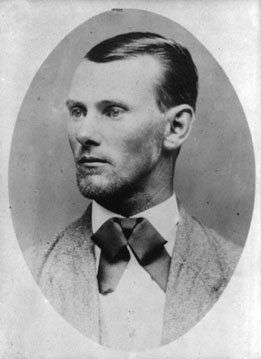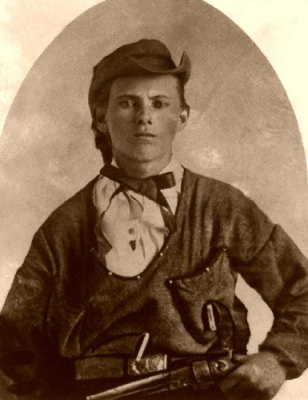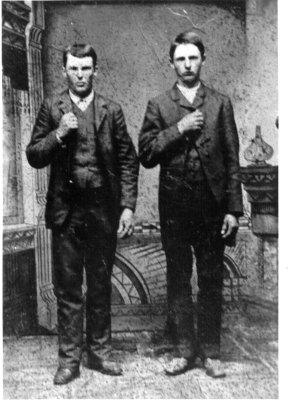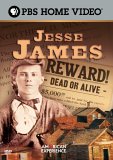| Reviews & Columns |
|
Reviews DVD TV on DVD Blu-ray 4K UHD International DVDs In Theaters Reviews by Studio Video Games Features Collector Series DVDs Easter Egg Database Interviews DVD Talk Radio Feature Articles Columns Anime Talk DVD Savant Horror DVDs The M.O.D. Squad Art House HD Talk Silent DVD
|
DVD Talk Forum |
|
|
| Resources |
|
DVD Price Search Customer Service #'s RCE Info Links |
|
Columns
|
|
|
American Experience - Jesse James

AMERICAN EXPERIENCE: JESSE JAMES
2006 / 60 min.
Director/Producer/Screenwriter: Mark Zwonitzer
Producer and Screenwriter: Leslie Valdes
Cinematographer: Michael Chin
Music: Brian Keane
Narrator: Michael Murphy
American Experience: Jesse James is another fascinating documentary from PBS Home Video (see their recent bio on Annie Oakley), shedding light and clarity on another mythical Western figure, although this time, unlike Oakley, there's no pleasant surprise in the revelation. It's a testament to the power of Hollywood's artistic achievements over the various decades that despite numerous films about the outlaw, so many people have so many divergent interpretations of Jesse James. Was he a western Robin Hood, robbing from the rich to give to the poor? Was he an anti-capitalist, anti-big business crusader, who fought against the insurmountable tide of industrialization and inevitable conformity? Was he a misguided patriot, a son of the Confederate who refused to see the lessons learned on both sides of the Civil War? Or was he a ruthless, cold-blooded killer?
Jesse James was born in 1847, in Missouri. His father was a slave-owning Baptist preacher and tobacco farmer, and his mother an intelligent, recalcitrant Confederate. At three years old, his father died, with many saying this loss of gentle influence on Jesse contributed to his later psychological problems. As tensions grew stronger with the build-up to the coming Civil War, Jesse's life progressed into an atmosphere of ever-growing violence. At age 9, the border skirmishes between Union-supporting Kansas and Confederate Missouri intensified, festering for five years until the official outbreak of the Civil War. It was said that Jesse witnessed many instances of intense violence at this crucial period of his development. His family gained a reputation for loudly proclaiming their right to see to their property - their land and their slaves - in their own way. This reputation would come back to haunt them as a family when Clay County was occupied by Unionist Missourian troops during the War. After brother Frank James was jailed, Jesse's mother had to sign an oath to the Union in order to get him out - an oath with which she then promptly renounced. This forceable act was perceived by Jesse as a stain on his mother's good name, requiring Jesse to right this wrong. During the course of the war, Jesse's physician stepfather was tortured for his Confederate views by Unionist troops, adding another insult to Jesse's pride, and providing another excuse for Jesse to exercise his Southern male credo which demanded absolute vengeance for slights against his family's reputation.
The last straw in shaping Jesse's already emerging psychotic personality was his association with William "Bloody Bill" T. Anderson, a terrorist Missouri bushwhacker who fought savage guerilla warfare with Unionist troops and any civilians with even the slightest hint of Union sympathies. Jesse joined Anderson's band of cutthroats willingly, and took part in some of the most ruthless, stomach-turning violence of the Civil War and after. The documentary strongly suggest that Jesse took part in the infamous Centralia Massacre, where Anderson and his bushwhackers killed and repulsively mutilated over a hundred unarmed Union troops. The incomprehensible carnage of this massacre greatly influenced public opinion to make Anderson's capture a priority. Union Colonel Samuel Cox, an old Indian tracker, was given the task of hunting down, and eventually killing Anderson. Jesse had lost another father figure, and would never forget this perceived "injustice."

After the war, when many Confederates were forced to come to grips with defeat, Jesse James refused, and continued to operate outside the conventions of society. Radical Republicans, who were pro-Unionist, controlled the Missouri government, and known Confederates and their sympathizers were largely shut out of any participation in government. In 1869, Jesse committed his first bank robbery, killing a clerk that he thought was Sam Cox, the killer of William Anderson. He was mistaken, but perversely, Jesse's case was taken up in the media by John Newman Edwards, a rabid pro-Confederate journalist who, for political purposes, championed Jesse's exploits, creating a false myth of Jesse as an innocent Southerner being persecuted by the Radical Republicans. This myth-making would continue on for Jesse (with his active participation), aiding him enormously in his further deadly exploits.
In 1874, when it looked like the public might be finally wising up to Jesse's, a poorly executed raid by Pinkerton detectives on a James' residence (a woman and child were injured, with no Jesse in sight), turned public opinion back in his favor. Jesse, who had now become a creature of his own publicity, continued on with his illegal activities. In 1876, the Great Northfield Minnesota raid, which was orchestrated by the James and Younger brothers, turned disastrously wrong, with Jesse and Frank barely escaping to Tennessee with their lives. Living under aliases, Jesse couldn't give up his life of crime, and gathered together another band of outlaws. Paranoid that his men were trying to kill him, and suspicious of any new people, Jesse James died at the hands of Bob Ford, who had conspired with the Missouri governor Thomas Crittenden, to infiltrate Jesse's gang, and kill him.
American Experience: Jesse James does an excellent job of detailing not only James' life, but also examining the dichotomy between the public's perception of James, which at the time of his death bordered on hero worship, and the truth; that Jesse James was a violent, psychotic criminal who shot in the back only those who were unarmed. Although it may not have been in the scope of this documentary to examine exactly why the public, despite facts to the contrary, continued to support James, I would have liked at least a small attempt to consider how or why this occurred. Of particular interest as well was the documentary's cumulative effect of showing an America vastly more violent and crude (the offer to buy James' body to put it on tour; Bob Ford's successful stage tour reenacting his successful assassination) than what exists today - despite today's papers and TVs screaming to the contrary. Perhaps that steady media drumbeat, ruled then and now by influential people with personal agendas, explains both James' ill-gotten hero reputation, as well as our own ill-gotten reputation for a society "out of control." American Experience: Jesse James is an absorbing, revisionist look at a "mythic" American figure who some still misguidedly consider a hero.

The DVD:
The Video:
American Experience: Jesse James's cinematography, courtesy of Michael Chin, is quite lush, and it looks immaculate on this enhanced widescreen transfer.
The Audio:
The Dolby Digital English stereo track is quite loud (especially during the gunshots), and achieves quite a bit of separation.
The Extras:
There are no extras for American Experience: Jesse James.
Final Thoughts:
American Experience: Jesse James definitively closes the book on whether or not Jesse James was a misguided "hero." He wasn't. I commend the documentary for having a variety of commentators and historians generally come to the same conclusion: Jesse James wasn't "forced" into a life of crime by historic movements beyond his control. Despite the political climate he grew up in, despite the violence he witnessed, he ultimately chose his own fate -- as did millions of other law-abiding people who grew up during the same time. I never thought of Jesse James as a hero, but I was never too clear on the exact details of his life, or the extent of his crimes. American Experience: Jesse James decisively cleared that up for me, in a polished, professional manner. I recommend American Experience: Jesse James.
Paul Mavis is an internationally published film and television historian, a member of the Online Film Critics Society, and the author of The Espionage Filmography.


|
| Popular Reviews |
| Sponsored Links |
|
|
| Sponsored Links |
|
|
| Release List | Reviews | Shop | Newsletter | Forum | DVD Giveaways | Blu-Ray | Advertise |
|
Copyright 2024 DVDTalk.com All Rights Reserved. Legal Info, Privacy Policy, Terms of Use,
Manage Preferences,
Your Privacy Choices | |||||||













